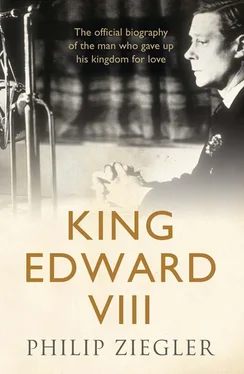‘I just don’t know what’s happened to me since “this ’ere armistice”,’ the Prince told Joey Legh in mid-December. ‘I’m so mad and restless that I can’t sit down to think and write.’ 97Sitting down and thinking was never to be one of his favoured activities, but the end of the war found him exceptionally agitated. He knew that what he was doing was of value, and did not dislike doing it, but at the same time he itched to escape from his military harness and address himself to his real profession. ‘I know that there is an enormous amount of work waiting for me in England, that is really why I’m so anxious to return and to “get down to it”,’ he told his father. Whether he would find the work tolerable once he had embarked on it, he did not know, but it was his future and he had better confront it now than later. He was more than ready for a change: ‘This makes the 6th Division I’ve visited in under a fortnight and it is wearing work.’ 98
He felt qualms about his ability to do the job ahead of him but also believed that he had qualifications lacking in any previous Prince of Wales and, still more, in King George V. There can be few sons in the same line of business as their father who do not from time to time believe that they have a monopoly of prescience and the spirit of progressiveness. The Prince was convinced that his father had failed to come to terms with the realities of the post-war world. In this belief he was fortified by the Queen. ‘I sadly fear Papa does not yet realize how many changes this war will have brought about,’ his mother wrote apprehensively. 99She did less than justice to the King, who could hardly have failed to notice the maelstrom which threatened to consume the heartlands of Europe. Bolshevik revolution had triumphed in Russia and was now rampant in Germany. ‘It all makes one feel anxious about the future,’ wrote the King; ‘all this sort of thing is very infectious, although thank God everything seems to be all right in this dear old country.’ 100The Prince was very doubtful whether all was right in Britain, or at least whether all would continue to be right once the euphoria of victory had subsided.
He was certain that he understood the fears and aspirations of his future people far better than his father ever would and at least as well as any from the despised legion of politicians. His years with the Army had given him an opportunity denied to any other prince of getting to know the common man. This knowledge was, in part at least, illusory. He could never shed the prejudices of his caste and generation. When he heard that two of his closest friends had been transferred to the front line, he wrote that he hoped it was not true, ‘as we must have a few “gentlemen” left after the war … I’m afraid that’s rather a snobbish thing to say, tho’ I mean it, and so I suppose I’m a snob!!!!’ 101He never doubted that, by training as well as breeding, ‘gentlemen’ were best qualified to run the country.
But unlike many of his contemporaries, he did not believe that the country was made for gentlemen. He knew that the men who had fought for Britain deserved more from society than they had enjoyed in the years before the war: better pay, better houses, better education for their children and treatment for their sicknesses. If their rulers failed to provide such treatment then they were not worthy to be rulers, were indeed not worthy of the title of ‘gentlemen’. His creed was simpliste perhaps, but it was generous and sincerely held. The war had left him a more thoughtful, socially conscious and open-minded man. At the end of May 1919 he received the Freedom of the City of London. Talking of his life as a soldier he told his audience:
The part I played was, I fear, a very insignificant one, but from one point of view I shall never regret my periods of service overseas. In those four years I mixed with men. In those four years I found my manhood. When I think of the future, and the heavy responsibilities which may fall to my lot, I feel that the experience gained since 1914 will stand me in good stead. 102
On the whole, it did.
5
L’Éducation Sentimentale
IT IS A TRUTH UNIVERSALLY ACKNOWLEDGED, THAT A SINGLE man in possession of a good fortune, must be in want of a wife. When that man is not only in possession of a good fortune but is heir to the throne of Great Britain, the want becomes imperious necessity. From the moment the Prince of Wales advanced into adolescence, the need to find him a suitable wife began to preoccupy the King and Queen, their advisers, and increasingly the Prince himself.
Traditionally, spouses for the royal children were drawn from the courts of Europe, most of which were intricately bound together in a great web of cousinship that was the delight of genealogists and the despair of less well-equipped historians. This avoided not only adulteration of the blood royal but also the embarrassment involved in raising any individual noble family above the others by admitting it to relationship with the throne. When Queen Victoria’s daughter, Princess Louise, married the future Duke of Argyll, the precedent was felt by many to be a dangerous one. Certainly such a match would never have done for a likely occupant of the throne. If the Prince of Wales, when young, did not share this view, he kept his doubts to himself. Whether he would have married Princess May must be uncertain, but that he would in the end have married some European princess is highly probable.
Then came the First World War, and in an instant many of the possible brides were transformed into enemy aliens. An already difficult problem became almost insoluble. ‘I hope some day you will find the woman who will make you happy!’ Queen Mary wrote to her eldest son, ‘but I fear this will not be easy as so much will have to be considered.’ 1The Prince was not over-worried by the inevitable delays. Physically slow to mature, he enjoyed the companionship of women but felt no strong urge to consummate the relationship. ‘I hope you are home by now,’ he wrote to a Grenadier friend in May 1916, ‘and having a jolly good time and are appeasing your sexual hunger, which I more than understand, tho’ don’t actually experience it myself, strange to say.’ 2With some fellow officers he visited a brothel in Calais and watched naked prostitutes striking a series of what were considered to be erotic attitudes. ‘A perfectly filthy and revolting sight,’ he called it, ‘but interesting for me as it was my first insight into these things!!’ 3
A little later all was changed. Towards the end of 1916 his equerries, Claud Hamilton and Joey Legh, decided that his virginity had been unhealthily protracted, took him to Amiens, gave him an excellent dinner with much wine, and entrusted him to the experienced hands of a French prostitute called Paulette. ‘She brushed aside his extraordinary shyness,’ recorded Lord Esher, to whom the Prince recounted a censored version of his experience. 4Paulette herself was permanently attached to an officer of the Royal Flying Corps and only on loan to the Prince for that and a few subsequent evenings, but she did her job with tact and skill. ‘A heavenly little woman of the kind,’ the Prince described her. 5From that moment, sex became one of the Prince’s most urgent preoccupations. ‘Oh! to set eyes on one of the darlings again,’ he wrote in anguish from the front in France, ‘how one does miss them, and I don’t think of anything but women now, tho what’s the use?’ 6At Sandringham, in January 1917, they sang in the drawing room after dinner and the Prince then settled down to his crochet work. ‘What an occupation for a fellow on leave!!’ he complained in his diary. Shooting pheasants was as empty a pastime as patience or crocheting: ‘I can’t raise much enthusiasm over … anything except women!!’ 7
Читать дальше












